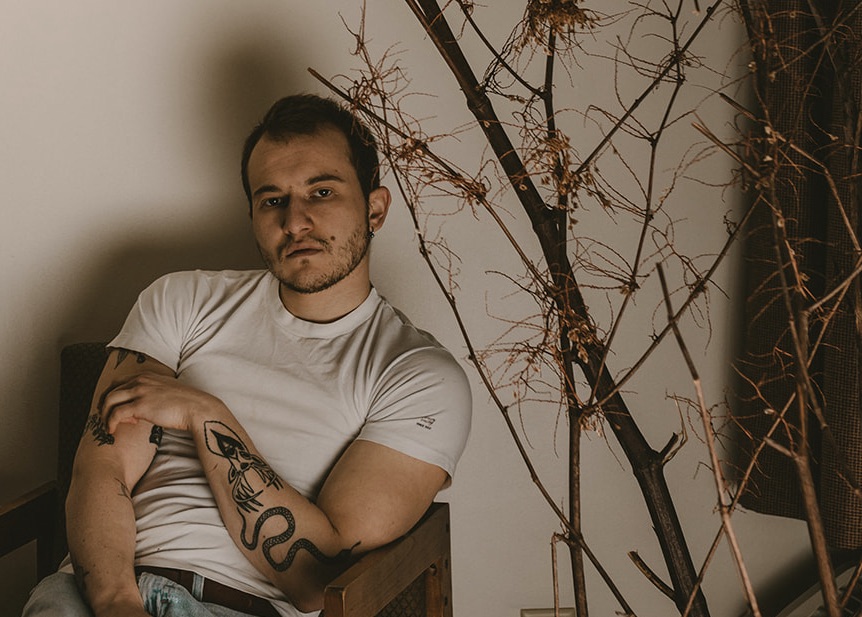
Every week, we’re here to remind you of the local artists we love and think you oughta know.
Part of growing up is realizing our parents are real humans with feelings, and with real, often relatable flaws. Sometimes that realization brings us closer to the people that raised us—sometimes not.
Northampton-based folk artist Izzy Heltai calls it knowing his parents in 3D.
He also wrote and released an album in October centered around this very idea, titled Father. The album sounds like autumn, with tinges of Fleet Foxes vibes in the melodies and their soothing harmonies. Musically, Heltai relies on his strengths in this one—it’s mostly his raw voice and acoustic guitar. But then there’s elements of alt. country when we hear the pedal steel guitar layered in (like on “The Stranger You’ve Become” and “Songbird”), and indie rock when he breaks out the electric guitar and piano (“To Talk About Yourself”).
It’s an album all about identity, from reconsidering romantic relationships, to coming to understand his father, and realizing that someday he could actually be a father (a gendered role that he had barely considered, being young and trans). But he didn’t exactly mean to write an album about it.
“It kind of just happened. Then when I stepped back and looked at this collection of songs, I realized this beautiful narrative that was pretty strong throughout it.”
In a way, it makes sense that songs about transformation surfaced on this album. Heltai, who originally hails from Brookline, wrote them all between the ages of 18 and 23, a time when many of us have the freedom to explore and start figuring out our own identities beyond our relationships with the people we’ve grown up with. “So much growth happens in that time. So it’s cool that these songs were there to parallel and personify that transition in my life,” Heltai says.
The process of coming into our identities is largely informed by who our parents are. For many of us, identity is wrapped up in the DNA we share with them. We’re also shaped by our environments, where we come from, and the motions we go through with our families. They could be simple, like the extracurriculars that our moms enrolled us in during middle school. And they could be intricate, like the traditions we practice, knowing our ancestors have done the same for centuries.
“My grandmother was an artist, and earlier in her life had been a concert pianist. Her grandfather was a translator for operas in Hungary,” he explains about his own ancestry. He also mentions that his father studied painting in college for two years before making a drastic change to pursue a career in STEM. His own first music memory involves watching a VHS tape of the Magic Flute, a live opera, at his grandmother’s house. “And I took classical piano lessons with this woman that used to take us to the ballet, too.” So, Heltai has artistry in his veins. Or at least, grew up in an environment likely to encourage him to explore that side of his identity.
But an aspect of his identity that was, perhaps, more difficult to come to terms with if we’re talking about family acceptance is being trans. That one’s all about self-affirmation for Heltai. That concept—of self-affirmation and staying present—is one that he’s obsessed with. He says, “Being trans gave me tools at a young age to… be like, ‘This is exactly who I am. Everyone’s gonna tell me that I don’t know what I’m talking about. But I need to know, and this is who I am.’ So, I could go out and fight for this thing that I know I need. I love that I got to do that at a young age. But it also equipped me even later in life to utilize those tools for so many other things. Because there’s so much more about my identity than just a gender.”
Now, self-affirmation has become part of his day-to-day routine. He’s constantly challenging himself to be present, to ask himself and those around him, “Is what you’re doing making you happy? Is this what feels good?”
That mindset even saw him through making music, both recording and performing virtually, during the pandemic. “Before this, I was on such an automatic grind. You just play, and keep going,” he recalls. “[During the pandemic] I tried to be on myself… it’s always good to recheck. And I really got that affirmation. This is like, really all I want.”
That said, we aren’t exalted from the things we say in our early twenties just because it’s a transformative time, or because we’re artists, or because we’ve lived through an epidemic. Heltai, like many other musicians, has parents who listen to his music and read his work. It couldn’t have been easy to title an album Father, write lyrics like “It’s been some time, love / since I felt like I was worth much / more than any other / reflected in my father’s eyes,” and just release them for the world, including his father, to see and hear.
But Heltai says having those conversations with his father ahead of releasing the album was all part of deepening their relationship, too. “When you humanize people, you realize mistakes and flaws. And that’s a part of fully knowing a person. And so there’s a beauty in that.”
Stream Father below via Bandcamp, and watch out for upcoming releases and virtual gigs by following Izzy Heltai via Facebook.
